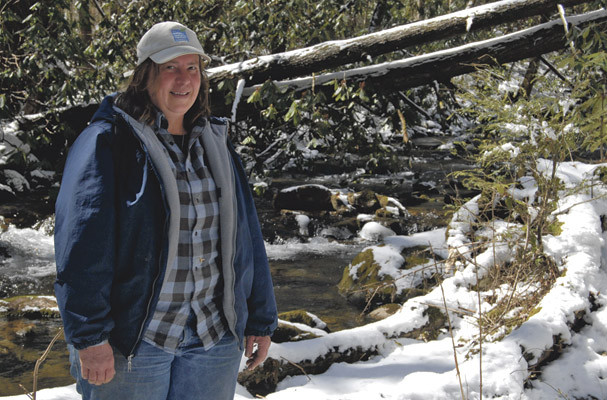
Warner grew up on a farm in a rural area in northeast Ohio. She studied at Kent State University and earned a bachelor’s degree in natural resources. “I didn’t know what I wanted to do, so I joined the Peace Corps and went to Tunisia,” Warner told The Beacon. “That was an incredible experience…The people were fantastic.” In Tunisia, Warner worked on a project where she planted a shrub, a tree, and grass at three separate locations to see which plant grew best in each location. After returning from two years in Tunisia, Warner began working in Los Angeles for the United States Department of Agriculture (USDA) in the mid-1980s. She then transferred to the U.S. Forest Service and eventually began working with the “Little Beagles” K-9 program in Orlando. In 2000 Warner purchased a home in East Tennessee, but did not move to the region for several years. In 2002 Warner’s father passed away. Six months later, her mother also died. “That was hard, but the way I look at it is that I now have two angels who guide my life,” Warner said. “That’s how I think I ended up in Rocky Fork. We all have angels. We just have to listen to them.”
For more than a month, Tunisia RPCV Brenda Warner has been making almost-daily trips into Rocky Fork to survey the plant life found on the 10,000-acre tract that was recently acquired by The Conservation Fund and U.S. Forest Service
More than a place on a map
By Keeli Parkey
March 25, 2009
Caption: ETSU grad student Brenda Warner during a recent trip into Rocky Fork. Photo: Keeli Parkey/The Beacon
For ETSU graduate student Brenda Warner, Rocky Fork is much more than a place on a map.
For more than a month, Warner has been making almost-daily trips into Rocky Fork to survey the plant life found on the 10,000-acre tract that was recently acquired by The Conservation Fund and U.S. Forest Service
Warner grew up on a farm in a rural area in northeast Ohio. She studied at Kent State University and earned a bachelor’s degree in natural resources.
“I didn’t know what I wanted to do, so I joined the Peace Corps and went to Tunisia,” Warner told The Beacon. “That was an incredible experience…The people were fantastic.”
In Tunisia, Warner worked on a project where she planted a shrub, a tree, and grass at three separate locations to see which plant grew best in each location.
After returning from two years in Tunisia, Warner began working in Los Angeles for the United States Department of Agriculture (USDA) in the mid-1980s. She then transferred to the U.S. Forest Service and eventually began working with the “Little Beagles” K-9 program in Orlando.
In 2000 Warner purchased a home in East Tennessee, but did not move to the region for several years. In 2002 Warner’s father passed away. Six months later, her mother also died.
“That was hard, but the way I look at it is that I now have two angels who guide my life,” Warner said. “That’s how I think I ended up in Rocky Fork. We all have angels. We just have to listen to them.”
The Beacon accompanied Warner on a recent trip into Rocky Fork. On the drive through south Unicoi County Warner described why the Rocky Fork tract is important for conservation.
“There is important scientific information to be gained by studying the plant life and animal life in Rocky Fork,” she said. “But there is something bigger there and that’s what I want to convey to people.
“Technically and scientifically the area is so rich and wonderful, but there’s a whole different aspect to it.”
The goal of Warner’s project is to survey Rocky Fork for its vascular flora. In other words, she will be surveying the area for the types of plants and the number of plants on the tract. She will catalogue whether the plants are rare, threatened, or endangered.
“It’s looking at everything,” she said. “It’s looking at what constitutes the vascular flora of Rocky Fork in 2009.”
Warner said the survey is important because now that the property has been preserved, the vegetation will be affected. Her survey will catalogue what vegetation is there now. A survey done in five, ten, or twenty years in the future could have very different results.
As an essential part of her project, Warner collects samples of the plants she finds. These samples will be kept at ETSU’s arboretum for future study.
“By taking permanent specimens someone ten years down the road will be able to compare the vegetation today with the vegetation they collect,” she added. “They will be able to do DNA analysis and other studies. The list is just tremendous of what can happen when you have a permanent collection.”
There is more to taking specimens than putting a plant in a bag. When Warner finds a plant to collect, she keeps track of its location from a GPS she carries with her. This will allow her to find the location of the plant in the future.
During her time in Rocky Fork Warner will also be looking closely at the Eastern Hemlocks found on the tract. “Eastern Hemlocks are being wiped out because of the Wooly Adelgid, a small insect,” she said. “They are found along streams. If they’re gone more sunlight gets in and affects the habitat of everything in the stream, like the trout habitat.”
Warner said the Eastern Hemlocks in Rocky Fork are newly-infested with the small insect. If the trees are treated quickly they can be saved and the other habitats will not be affected.
The rare, threatened, and endangered plants Warner finds will be reported to the Natural Heritage Database.
Warner’s survey will also help The Conservation Fund and the U.S. Forest Service decide how to manage the property.
“This is a very important project,” she stated. “This is all for the future.”
Between The Conservat-ion Fund, the U.S. Forest Service, and individuals like Brenda Warner, the future of Rocky Fork is in good hands.
“Rocky Fork is so peaceful,” Warner also said. “All the problems that we face, that we’re inundated with disappear. The world just goes away there.”











